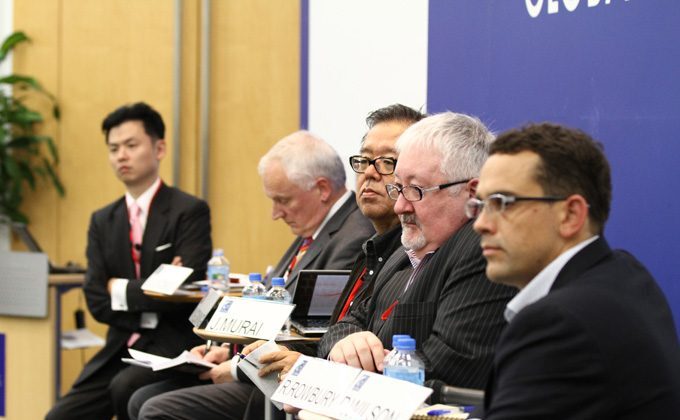Japan’s massive earthquake and tsunami on March 11, 2011, were instantly followed by a tidal wave of traffic on Twitter. New media can – and should – play a crucial role in helping Japan become a less insular and more open nation.
On that fateful day, no less than 66 percent of the news links on social networking and microblogging services were about the disaster in Japan. That’s according to the Pew Research Center‘s Project for Excellence in Journalism’s New Media Index, which listed the ways people used Twitter after the quake and tsunami hit:
• Providing breaking information from a variety of official and unofficial sources, including eyewitness accounts
• Acting as an electronic bulletin board, passing on tips about everything from the location of bathrooms to ways of tracking loved ones
• Helping to raise funds for the recovery effort and for users to express their thoughts and condolences for the victims
“Twitter had a great impact after the earthquake,” noted Jun Murai, Dean and Professor at Keio University’s Faculty of Environment and Information Studies, during the “Media, Old and New” panel discussion at the G1 Global Conference 2011 on November 3.
Twitter Japan country manager Masaakira James Kondo contrasted the speed with which information was shared via new media on March 11 with the situation after the Great Hanshin Earthquake in 1995, when the internet was just starting to become popular.
Social networking site Facebook, meanwhile, played an important role in enabling users to exchange information about the dangers posed by the escalating nuclear crisis after March 11, with mainstream media reports subjected to plenty of analysis and criticism.
Thanks to new digital and social media, information is now disseminated faster and more widely than by traditional media such as newspapers and television. That, plus the interactive nature of these new media, represents a paradigm shift with profound sociopolitical implications comparable to the revolutionary impact of Gutenberg’s introduction of the printing press to Europe in the 15th century.
Perhaps the biggest effect of the new media is that people now have a more proprietary attitude toward information.
“This is forcing a new accountability on governments,” noted Nik Gowing , BBC World News’ Main Presenter, during the panel discussion.
“The public expect information – if they don’t get it, there is a deficit of legitimacy,” Gowing said. “The [March 11] tragedy was big enough, but the government handling of information made it worse.”
A key question concerning the role new media played in the wake of the March 11 disaster is to what extent they can make Japan, with its traditional deference toward authority and concentrated ownership of traditional media, a more open and democratic society.

“Japan is a little bit slower and more reluctant, but we are seeing a new age of accountability,” said Ross Rowbury, president and representative director of public-relations company Edelman Japan. He said many Japanese companies have learned valuable lessons from the role played by new media after March 11 and are using platforms such as live video-streaming site UStream in innovative ways to get their message across.
As Gowing noted, “It’s not a PR world anymore – it’s a public engagement world.”
The rise of new media is also having a profound effect on traditional media, which now have to play a very serious game of catch-up. Murai noted how traditional news organizations are using social media such as Twitter as news sources – while taking care to check the veracity of the information they glean from the Twittersphere.
“Twitter is a useful and important part of the news-gathering business,” Gowing pointed out. “And yes, we have to be careful, mediate, and authenticate. We’ve got to find new filtering methods for what we’ve always done.”
The discussion brought to mind Marshall McLuhan’s famous dictum that “the medium is the message.” McLuhan’s point was that a communications medium affects society not through the content it delivers, but by the nature of the medium itself. His thesis is supported by the impact new digital and social media are having on society, particularly in Japan, where the March 11 megaquake has helped trigger a seismic shift in the media landscape.
Just how Japanese society will evolve as this paradigm takes shape remains to be seen. But there’s no doubt that new media can – and should — play a crucial role in helping Japan become a less insular and more open nation.



